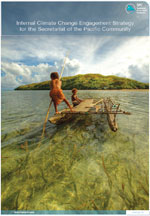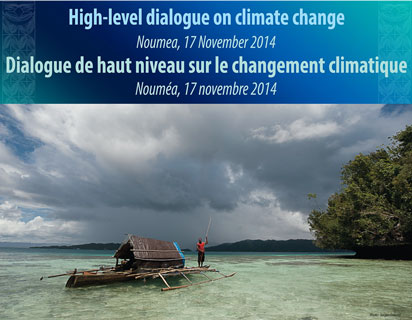SPC’s vision
A secure, resilient and prosperous Pacific Community, whose people are educated and healthy and manage their resources in an economically, environmentally and socially sustainable way.
SPC is committed to helping Pacific Island countries and territories (PICTs) address the risks posed by climate variability and climate change. The Pacific region has for centuries been vulnerable to natural climate hazards such as floods, droughts and cyclones. The frequency of such events varies over time due to phenomena such as the El Niño Southern Oscillation. Climate change resulting from increased greenhouse gases emissions is posing additional risks for the region, such as increasing air and sea surface temperatures. SPC is working to help PICTs respond to the risks and impacts of climate variability and climate change through its sectoral work and its ‘whole of organisation’ approach, in partnership with other members of the Council of Regional Organisations in the Pacific (CROP).
SPC develops multi-sectoral responses to climate change and disasters, and supports PICTs' efforts in the areas of climate change and disaster risk management. Using integrated approaches based on education, ocean and coastal geoscience, risk assessment, GIS and related technologies, SPC helps countries develop climate resilience initiatives and management techniques, as well as tools to improve the adaptation of agricultural systems and coastal fisheries and enhance the resilience of local livelihoods. In addition SPC provides support to PICTs in accessing climate finance.
SPC also contributes to regional and international initiatives aiming at supporting PICTs address climate change, including:
- the Pacific NDC Hub, which provides targeted support to 15 countries in the Pacific region to enhance and implement their climate targets as per the Paris Agreement
- the Kiwa Initiative, a multi-donor initiative for biodiversity protection and climate change adaptation using Nature-based Solutions in the Pacific.
Climate Change Engagement Strategy for SPC (2011–2015)
The strategy provides an overarching framework for SPC’s climate change work, sets organisational objectives and identifies key result areas against which progress can be monitored.
The Goal : Pacific Island countries and territories are able to effectively manage the risks presented by climate change.
Basis of the strategy :to assist Pacific Island countries and territories to adopt a sustainable ‘whole of country, whole of region’ approach to addressing climate change challenges, through identification of risks and provision of relevant climate change knowledge, technical assistance and resources to enable them to make informed policy and operational decisions.
Strategic outcomes
The climate change engagement strategy targets three strategic outcomes:
- Strengthened capacity of Pacific Island communities to respond effectively to climate change
- Climate change integrated into SPC programmes and operations
- Strengthened partnerships at the regional and international level
SPC’s support for achieving these outcomes is described in the following matrix:
SPC climate change support activities in Pacific Island countries and territories
SPC is carrying out a variety of climate change activities through its six technical divisions and its Strategic Engagement, Policy and Planning Facility. For more information about specific activities relating to climate change, follow these links:
SPC also implemented several climate change projects through to 2015 including:
- Coping with Climate Change in the Pacific Island Region (CCCPIR) implemented in partnership with Deutsche Gesellschaft für Internationale Zusammenarbeit (GIZ) on behalf of the German Federal Ministry for Economic Cooperation and Development (BMZ)
- Global Climate Change Alliance: Pacific Small Island States (GCCA: PSIS) Implemented by SPC and funded by the European Union (EU)
International Climate Change Adaptation Initiative: Building resilience in fisheries, agriculture and health Implemented by SPC and funded by the Australian Agency for International Development (AusAID) - Vegetation and Land Cover Mapping and Improving Food Security for Building Resilience to a Changing Climate in Pacific Island Communities Implemented by SPC and funded by the United States Agency for International Development (USAID)
High-level Dialogue on Climate Change
 17 November 2014, Noumea, New Caledonia
17 November 2014, Noumea, New Caledonia
At the initiative of SPC, Pacific Island leaders gathered in New Caledonia to discuss critical challenges linked to climate change with the President of the Republic of France, M. François Hollande, French Minister for Foreign Affairs and International Development, M. Laurent Fabius, Minister for Overseas Territories, Mme George Pau-Langevin, and the President’s Special Envoy for the Protection of the Planet, M. Nicolas Hulot.
The High-Level Dialogue on Climate Change, hosted by SPC at its headquarters, has given Pacific leaders a platform to move the agenda forward on the serious climate change challenge for the region and its real impact on the lives of Pacific Island people.
Leaders discussed the profound effect of climate change and related extreme weather events on fragile Pacific economies, on people's livelihoods and on their access to food and water.
The event occurred nearly one year before France hosts the 21st session of the Conference of the Parties to the UN Framework Convention on Climate Change (UNFCCC) in Paris, where a new, universal climate agreement is due to be adopted.